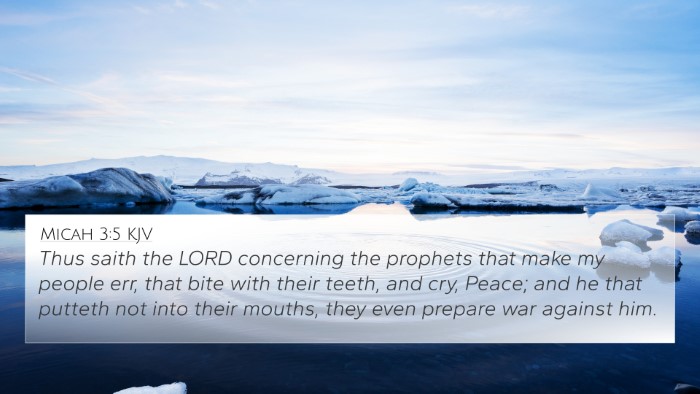Psalms 28:3 - Meaning and Interpretation
Psalms 28:3 states: "Draw me not away with the wicked, and with the workers of iniquity, which speak peace to their neighbours, but mischief is in their hearts."
This verse conveys a deep plea for divine preservation and protection from the fate of the wicked. The psalmist expresses concern over being associated with those who outwardly appear benign but harbor evil intentions.
Summary of Insights
- Matthew Henry: He emphasizes the importance of separating oneself from the wicked. The psalmist requests that he not be drawn away with them, underlining a fear of being treated as one of those who are hypocritical in their dealings. The evident contrast between words and the heart’s true intentions is a focal point of his observation.
- Albert Barnes: Barnes elucidates the significance of moral integrity. He notes that the wicked often cloak their intentions with false peace, highlighting the deceptive nature of sin. The psalmist's request is not only for personal protection but also for a recognition of God's justice towards the wicked.
- Adam Clarke: Clarke comments on the dangers of false friendship and the need for discernment. He interprets "speak peace" as a call to be aware of those whose actions twist truth and falsehood. The plea is thus both personal and communal, desiring justice for the righteous amid deception.
Connections with Other Bible Verses
Psalms 28:3 highlights themes found in various other passages. The following verses offer significant cross-references that enrich understanding of this verse:
- Psalms 1:1 - "Blessed is the man that walketh not in the counsel of the ungodly..." - This emphasizes the importance of avoiding the company of the wicked.
- Proverbs 24:1 - "Be not thou envious against evil men, neither desire to be with them." - Here, the wisdom literature parallels the idea of rebellion against imitating wickedness.
- Jeremiah 9:8 - "Their tongue is as an arrow shot out; it speaketh deceit..." - This reflects on the deceptive nature of words in comparison to wicked intentions.
- Romans 16:17 - "Now I beseech you, brethren, mark them which cause divisions and offences contrary to the doctrine..." - In the New Testament, there remains a parallel caution against those living dishonestly although appearing sincere.
- Matthew 7:15 - "Beware of false prophets, which come to you in sheep's clothing, but inwardly they are ravening wolves." - A stark warning about appearances versus reality.
- James 3:14 - "But if ye have bitter envying and strife in your hearts, glory not, and lie not against the truth." - Reflective of inner conflict, aligning with the psalmist's observation of hidden mischief.
- 1 John 3:18 - "My little children, let us not love in word, neither in tongue; but in deed and in truth." - This reinforces the need for genuine actions over deceitful words.
- Ephesians 5:6 - "Let no man deceive you with vain words: for because of these things cometh the wrath of God upon the children of disobedience." - Warning against deception connects directly to the intentions spoken of in Psalms 28:3.
- 2 Timothy 3:13 - "But evil men and seducers shall wax worse and worse, deceiving, and being deceived." - This statement foreshadows the ongoing nature of wickedness, tying directly to the psalmist's concerns.
- Psalm 7:14-16 - "Behold, he travaileth with iniquity, and hath conceived mischief, and brought forth falsehood." - A vivid illustration of the internal workings of the wicked, resonating well with Psalms 28:3.
Reflection on Thematic Connections
This verse invites readers to consider broader themes relating to the nature of righteousness and evil, particularly:
- Hypocrisy: People who present a façade of peace while plotting harm.
- Divine Justice: The ultimate fate of the wicked versus the plight of the righteous.
- The Nature of Speech: How words can mislead and misrepresent intentions.
- Personal Integrity: Maintaining one’s character in the face of deceitful influences.
By intertwining cross-references between these verses, interpreters gain a more profound understanding of the underlying messages within Psalms 28:3. It serves as a reminder to discern the motives behind words spoken and to seek God’s guidance and preservation in the midst of a world where true intentions are often masked by false peace.
Tools for Further Study
For those looking to delve deeper into cross-referencing and thematic study, consider utilizing the following:
- Bible Concordance: To find terms and their occurrences throughout scripture.
- Bible Cross-reference Guide: To identify thematic links throughout the Bible.
- Cross-reference Bible Study: Methodologies for associating different scriptures.
- Bible Reference Resources: Materials for deeper scholarly insights.
- Bible Chain References: Connecting verses in a systematic way for study.
Conclusion
This exploration of Psalms 28:3 illustrates the wealth of meaning found within the texts of scripture. Through careful observation and study of cross-referenced verses, believers can cultivate a richer understanding of God’s word and the importance of true integrity in a world rife with deception.


















